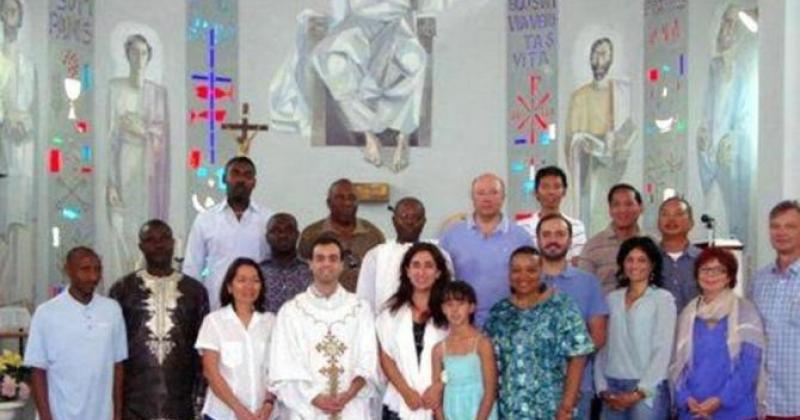The young apostolic prefect, Fr. Mario León Dorado, talks to Vatican Insider about his years of working in an area marked by tensions and struggles
“When Spain left Western Sahara in 1975, the Catholic Church had two choices about what to do with the apostolic prefecture that had been opened here in 1954: shut it down - seeing as though most of the people it was intended for were Spaniards returning to their homeland - and entrust it to the jurisdiction of Rabat or keep it going as a sign of peace and testimony in this land,” this was the explanation given by Fr. Mario León Dorado, young apostolic prefect of Western Sahara, for the Catholic Church’s decision to maintain its presence in this totally Muslim area, long-afflicted by conflict and tensions. Fr. Dorado, a Missionary Oblate of Mary Immaculate, who was appointed to the post in 2013, said “the minimum age is 40, we had to wait for my birthday…” Together with an Oblate confrère, he is the Church’s main reference point in an area surrounded by desert, for decades contested by Morocco – which sees it as part of its southern region – and the Sahrawi Arab Democratic Republic (SADR). SADR’s government is in exile in Algeria’s refugee camps. The state is only recognised by African, South-American and Asian countries and is confined behind the world’s longest wall (2700 km, surrounded by anti-personnel mines), in a strip of land known as the “Free Zone” or Liberated Territories”, squeezed between Western Sahara and Mauritania.
Mario Dorado, who has been serving as apostolic prefect in Laayoune – capital of Western Sahara – along with three other Oblate Missionaries, historically present in the area, is now a member of the North Africa’s regional Episcopal Conference. In his interview with Vatican Insider, he spoke passionately about the significance of the mission his Prefecture has been entrusted with.
“The Prefecture was set up by Pope Pius XII in 1954. The mission has changed a great deal since then, also in terms of its direction: During his last ad limina visit, Pope Francis encouraged us to testify the Gospel with our life. This is the most important challenge: communicating Jesus’ knowledge and the knowledge of his Gospel by testifying it with our existence. The Church in Sahara nurtures a special sentiment towards the Saharawi people: we are the only institution left. We chose to stay faithful to our vocation and stick by the local people. Of course, the demography has changed significantly in recent decades. Cultured people who speak Saharawi are now a minority. Most of our neighbours speak Moroccan, their culture and families are of northern descent. Still, we are here, loyally standing at the side of the Moroccan and Saharawi people, a sign of Christ’s presence. As is known, tensions are running high. One of the biggest problems I that many Saharawi families have been separated since the 1970s (split by the practically unsurmountable wall, Ed.) and meeting is neither easy nor affordable (families would need to embark on a marathon journey across Mauritania without the certainty of being allowed in, Ed.). By land, there are in fact only 200 km separating us but the territory is teeming with mines and fencing and the wall is guarded by thousands of soldiers.”
What activities is the Prefecture engaged in?
“My confrère and I are in charge of the Prefecture’s pastoral work, although there’s not much. We are the only official ecclesial presence. There are some Christians here but they are very few and most of them are either passing through (chiefly migrants) or are here for work purposes. We also look after the social aspect but in a very discreet way. Finally, we must mention our peaceful co-existence with our Muslim friends and brothers.”
In this field we are experiencing a moment of severe tension in which one senses a clash between civilisations…
“Of course, these are difficult times. I quote Pope Francis, who said that we are at war but not a religious war. If we asked Muslims in Laayoune and Dakhla, which is the area we live in, the vast majority would say that Islam is a peaceful religion. My feeling is that Islam, like the West, is going through a period if acute internal tension. Islam, in many cases, is at war with itself, dozens of Muslims die in attacks each day: Shiites, Sunnis, conservatives, progressivists, radicals… It’s terrible. But the West is also facing a crisis and we Christians are in neck-deep, just look at our local communities.
I must remind you, however, that when Fr. Jacques Hamel was murdered in Saint-Ettienne-du-Rouvray, some friends expressed their condolences to me.
This alleged war is not between Christians and Muslims, it is at the heart of the Muslim world, transcending it and affecting us non-Muslims too.
Our presence aims to be Christ’s presence, His Church’s presence, which is essentially no different to the Church’s presence in other regions; it is just simpler, poorer and more humble. But as in any other part of the world, it aims to offer assistance, love, mercy and substance. Dialogue is day-to-day co-existence. We feel like priests whose neighbours may not go to church every day but they meet them every day, talk to them about their lives, their problems, play cards or dominoes with them, have a coffee (or a tea in our case) with them, visit them in their homes.”
